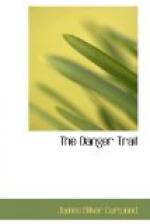He laughed aloud and began pacing back and forth across the rotted floor of his prison as he pictured the consternation of the two seniors. And then a flush burned in his face and his eyes glowed as he thought of Meleese. In spite of himself she had saved him from his enemies, and he blessed Croisset for having told him the meaning of this flight into the North. Once again she had betrayed him, but this time it was to save his life, and his heart leaped in joyous faith at this proof of her love for him. He believed that he understood the whole scheme now. Even his enemies would think him dead. They would leave the Wekusko and after a time, when it was safe for him to return, he would be given his freedom.
With the passing of the hours gloomier thoughts shadowed these anticipations. In some mysterious way Meleese was closely associated with those who sought his life, and if they disappeared she would disappear with them. He was convinced of that. And then—could he find her again? Would she go into the South—to civilization—or deeper into the untraveled wildernesses of the North? In answer to his question there flashed through his mind the words of Jean Croisset: “M’seur, I know of a hundred men between Athabasca and the bay who would kill you for what you have said.” Yes, she would go into the North. Somewhere in that vast desolation of which Jean had spoken he would find her, even though he spent half of his life in the search!
It was past midnight when he spread out the furs and undressed for bed. He opened the stove door and from the bunk watched the faint flickerings of the dying firelight on the log walls. As slumber closed his eyes he was conscious of a sound—the faint, hungerful, wailing cry to which he had listened that first night near Prince Albert. It was a wolf, and drowsily he wondered how he could hear the cry through the thick log walls of his prison. The answer came to him the moment he opened his eyes, hours later. A bit of pale sunlight was falling into the room and he saw that it entered through a narrow aperture close up to the ceiling. After he had prepared his breakfast he dragged the table under this aperture and by standing on it was enabled to peer through. A hundred yards away was the black edge of the spruce and balsam forest. Between him and the forest, half smothered in the deep snow, was a cabin, and he shuddered as he saw floating over it the little red signal of death of which Croisset had told him the night before.
With the breaking of this day the hours seemed of interminable length. For a time he amused himself by searching every corner and crevice of his prison room, but he found nothing of interest beyond what he had already discovered. He examined the door which Croisset had barred on him, and gave up all hope of escape in that direction. He could barely thrust his arm through the aperture that opened out on the plague-stricken cabin. For the first time since the stirring beginning of his adventures at Prince Albert a sickening sense of his own impotency began to weigh on Howland. He was a prisoner—penned up in a desolate room in the heart of a wilderness. And he, Jack Howland, a man who had always taken pride in his physical prowess, had allowed one man to place him there.




